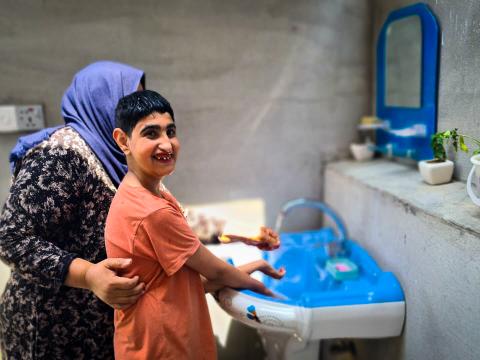Little Harith’s longing for inclusion and the ability to express

When little Harith was born, he suffered from jaundice, a yellow discoloration of the skin. His parents, Suha* and Jamal* got worried immediately and took him to a medical specialist. The medical specialist then advised that Harith’s blood be changed. However, since Suha and Jamal did not have the financial means, they could not follow his recommendation. Suha said, “Now I regret it very much. He was not moving and wasn’t crying, so day after day we realised more fully his situation. When I see him like this, I am forever regretful. But what can I do? It is difficult the way it is.”
Suha (47) is a widowed mother of six children. The eldest is 23 and the youngest is 11. Harith is 16 years of age. Harith along with his eldest sister suffer from a condition in the brain that makes them suffer from poor sight, the inability to talk, and difficulties with moving.
Jamal, Harith’s father, was killed in a car accident in 2014, and Suha then had to carry on her shoulders all the responsibilities of caring for and raising her six children. Later that year Suha and her children were also displaced from the outskirts of Tooz where they had lived their entire lives. They moved to the city of Tooz. Suha said about that year, “In 2014 we lived in a very bad situation.”
Today, Suha relies mostly on charitable people to provide her with financial assistance to support her family. She lives in a rented unfinished house, but she is grateful that she at least has a roof over her children’s heads.
Only two of Suha’s children are able to go to school. Some of her children dropped out of school after the displacement meanwhile her eldest daughter, Salwa (23), and Harith cannot study due to their poor eyesight and the inability of the schools to provide them with educational support due to the nature of their disabilities. Through help from charitable people, Suha is able to send her daughter and son to school in a shared cab with other students. Suha shared, “I cannot do anything. I cannot work or go out. All my time is for [my children]. My other children didn’t continue schooling because of the displacement. They are at home.”
Suha and Harith share a very strong bond as most of the time it is for Suha to take care of Harith, help him with bathing, eating and moving around. Suha notices that Harith likes to watch TV or use the mobile phone most of the time despite his poor eyesight.
When Harith often hears his brother go to school. He likes to accompany him as well and wishes he could have a school bag or new clothes like him. But Suha says, “I cannot afford to buy him since he doesn’t need it. His siblings love him so much and treat him well. I wish that he could just talk. Because of the difficulty with his communication such that he can’t express himself, Harith cries often.” Suha continued, “He doesn’t go out because the children in the neighborhood bully him and call him names. My children are always confined to home watching TV. Now the TV is broken but I cannot afford to fix it for them.”
Suha ended, “When I see other parents go through the same, I feel for them.”
We believe that by providing awareness sessions to children, government employees, and school staff about disability inclusion and sensitivity, targeting specific children living with disabilities and helping them feel empowered, children like Harith will have a completely different, safe and an empowered environment to live in and thrive.
The legacy of conflict upon already vulnerable people - women, girls, and people living with disabilities - is an even more precarious situation, while limited opportunities and access to services and facilities are ongoing challenges. World Vision Iraq therefore seeks potential partnerships and funding opportunities further to help Iraqi people living with disabilities, women and girls at risk.
*Some of the names have been changed to protect identity.